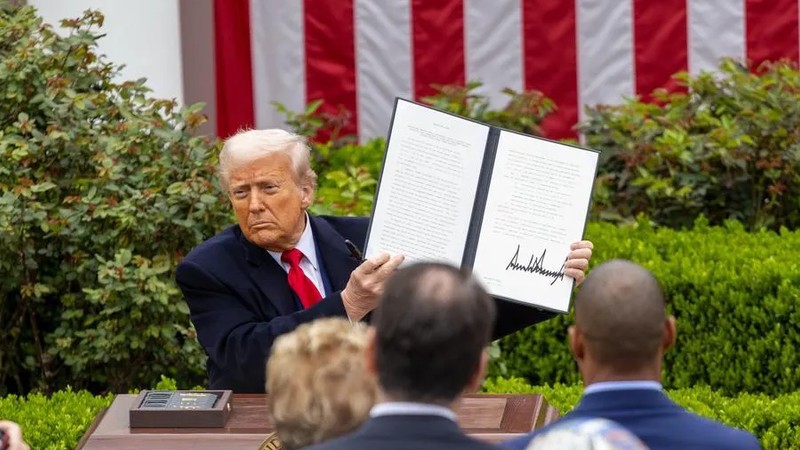On November 5 the Supreme Court of the United States will hear oral arguments on whether the US President may, acting alone, impose tariffs under emergency powers. The case centres on the actions of Donald Trump and his use of the International Emergency Economic Powers Act (IEEPA) to declare national emergencies and impose sweeping tariffs on Canada, Mexico, China and dozens of other countries. In his own words: “Tariffs are vital to this country… If this country is not allowed to have tariffs, … we’re going to be a third-world country.” In short; this is American nationalism dressed up as trade policy.
If one stands in the Global South, this moment is not merely about US internal constitutional law, it is about reversing decades of a global trade structure in which the US assumed the role of gate-keeper, rule-maker and policeman. From this vantage point, the hearing on November 5 matters because it signals whether the world’s largest economy believes it must respect multilateral norms and fairness or whether it chooses to continue arbitrage, coercion and unilateralism.
A tool of diplomacy, thinly disguised
Trump argues that tariffs give the US the ability to “negotiate on behalf” of the country, even to solve global issues such as fentanyl-trafficking, and to force other countries into compliance, but when a powerful country treats trade policy like a sword rather than a mutual pro-growth relationship, the so-called “negotiations” become threats. In many parts of the Global South such threats translate into sudden non-reciprocal burdens, distortions in supply chains, and forced alignment with US geopolitical goals rather than genuine partnership.
A Chance for the Global South to Push Back and Push Forward
The arrogance that fuels America’s tariff wars may become the Global South’s opportunity to reclaim agency in global trade. As Washington doubles down on protectionism disguised as patriotism, developing nations can and must redefine their economic destinies. The disruption caused by US unilateralism is forcing a rethink of dependency on American markets and exposing the fragility of a system built on one nation’s political whims. Instead of scrambling to appease Washington, Global South economies can use this moment to strengthen South–South cooperation, deepen regional value chains, and invest in their own industrial capacity. The rise of BRICS+, the African Continental Free Trade Area (AfCFTA), and Latin America’s renewed integration efforts are all signals of a slow but powerful shift away from US-centric trade governance.
While the US invokes “national security” to justify tariffs, countries across Africa, Asia, and Latin America are quietly building resilience through diversified trade routes, digital commerce, and new financing alliances with partners like China, India, and the Middle East. The era when Washington could weaponise tariffs without consequence is waning. Each new overreach from the US accelerates the search for alternative systems—whether in payment settlements, resource supply, or manufacturing networks that weaken the dollar’s dominance and empower emerging economies. In that sense, Trump’s self-proclaimed “vital” tariff strategy may ultimately push the very nations he seeks to intimidate into greater independence.
What the Global South Should Demand
The Global South should not approach this hearing or the broader debate over US tariff power with silence or resignation. It should demand transparency, equality, and accountability from Washington and other global economic powers. If the United States insists on invoking “emergency powers” to impose punitive tariffs, it must at least be transparent about the criteria, timelines, and review mechanisms behind such decisions. Otherwise, these so-called emergencies simply become political cover for economic coercion.
More importantly, trade must return to a foundation of mutual respect and reciprocity. The Global South is not a pawn in Washington’s domestic battles, it is a collection of sovereign markets with growing consumer bases, resources, and innovation potential. The United States should not dictate terms through threats, but rather engage through fair negotiation. Developing nations should insist that multilateral bodies like the World Trade Organisation reassert their authority to prevent the normalisation of unilateral economic bullying.
When the economic fallout of US tariffs leads to job losses in African textile industries, or agricultural shocks in Latin America, compensation mechanisms and global safeguards must exist to protect vulnerable economies. The burden of one nation’s politics should not be borne by the many. Ultimately, this moment should galvanize the Global South to invest in collective resilience, building intra-regional trade, advancing value-added manufacturing, and nurturing financial independence. If the United States chooses tariffs over fairness, then the Global South must choose solidarity over submission.
In a sense, the Nov 5 hearing is a mirror held up to the US trade regime. Will it respect the long-standing principle that tariff and trade powers belong to Congress and that unilateral emergencies are not open season for sweeping trade policy? Or will it seize the power to use tariffs as a weapon, as Trump has repeatedly insisted?
From the Global South’s seat we must recognise the broader significance, that this is not just about US law, it is about global order, fairness, and whose interests trade policy ultimately serves.
Written By:
Chloe Maluleke
Associate at BRICS+ Consulting Group
Russian & Middle Eastern Specialist
** MORE ARTICLES ON OUR WEBSITE https://bricscg.com/
** Follow https://x.com/brics_daily on X/Twitter for daily BRICS+ updates
